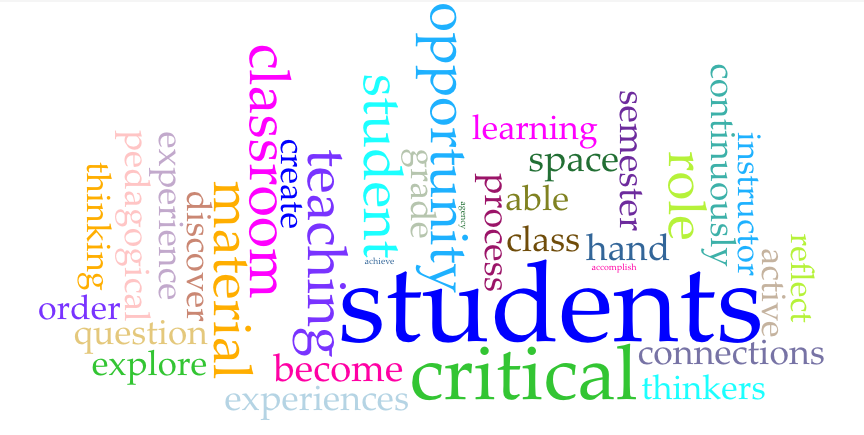Beyond student engagement: becoming active critical thinkers

(Published by The Humanities Alliance on October 4, 2017)
After teaching every semester for the past four years, observing a class has been a gratifying experience as well as an (unexpectedly) thought-provoking one. On the one hand, I felt, and I still do, that it is the perfect opportunity to sit back and reflect on my teaching and learning experiences without over-thinking the lesson planning; and to look for the most effective way to give feedback or grade quizzes and exams. On the other hand, having the role of an observer this semester has been harder than I expected. I have become much more aware and more critical of my own pedagogical practices and my role as an instructor (but, isn’t this the kind of critical thinking that we are continuously asking from our students?). As observers, we are neither here nor there. We are not the facilitators of the teaching material within the classroom, nor are we the students who officially registered for the class and are receiving a grade for our performance. It is from this critical space that I start to question who I have been, who I am and who I want to be as a teacher/instructor/facilitator.
I believe that My pedagogical philosophy has always stressed the development of student agency in the process of building relationships between language and sociopolitical issues and establishing connections between their own lives and the world(s). I realize that in order to be able to accomplish this, it is crucial to know and understand who our students are and where they are coming from.
We had the exceptional opportunity to personally explore and discover the diverse student body from LaGuardia Community College (I recognize how fortunate we are) and, to learn about the history of the institution and its role within the urban setting of New York City through several voices. During the time we spend with our students, we must create a space in which each student’s experience is unique. By bringing their own experiences to the classroom and giving them voice, students have the opportunity to achieve all their capabilities and growing potential.
In order to foster inquiry, however, it is imperative to create an environment where students feel comfortable questioning and problematizing any aspect of the material. Starting from day one, “why?” should be our perpetual question. By continuously generating hypotheses, questions and/or problems for which we are not going to have all the answers, we promote interactions, spaces, and opportunities to explore, discover, review and reflect. By applying their knowledge inside and out of the classroom, students are able to establish the necessary connections between the content/material and society, in linguistic, historical, cultural, social, and political terms. By engaging and challenging our students to delve deeper into their learning process we motivate and guide them to become active critical thinkers.
0 Comments